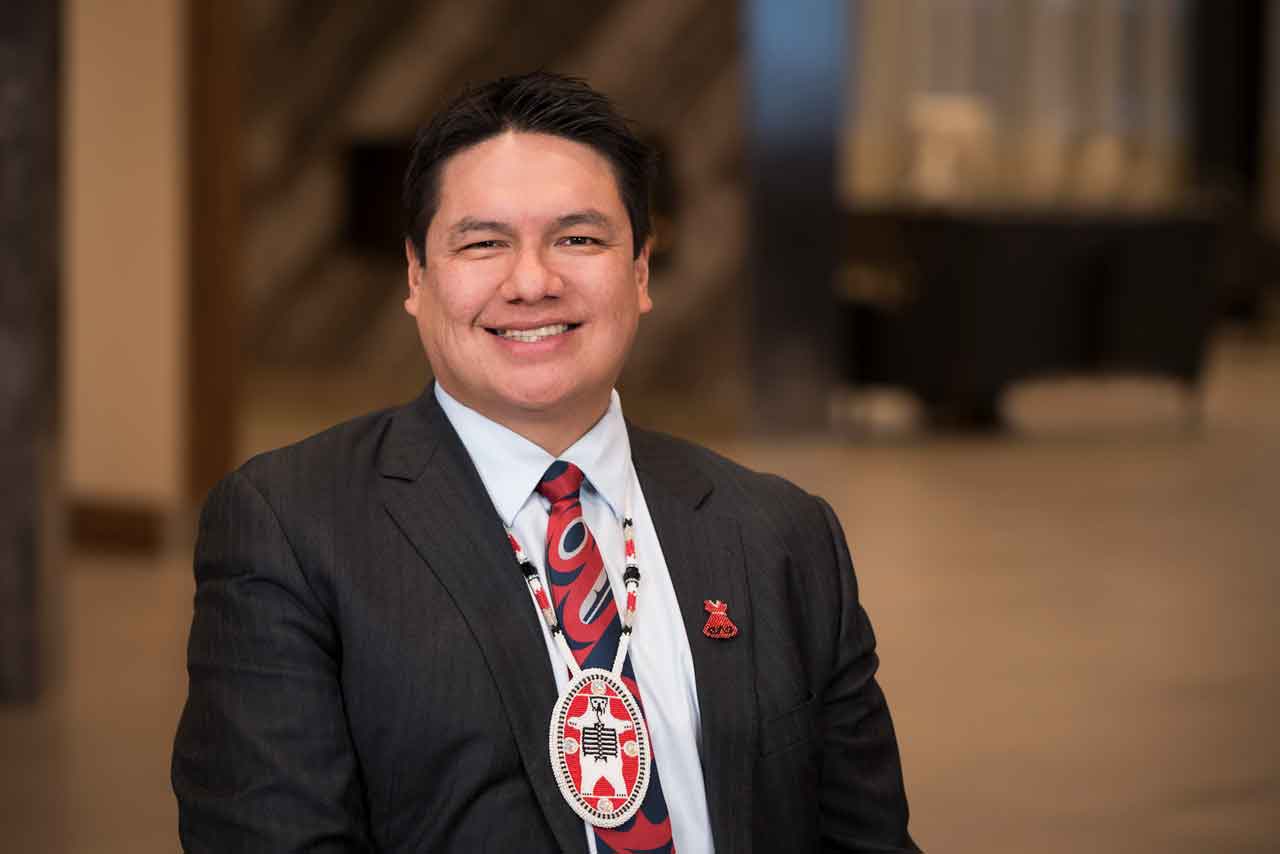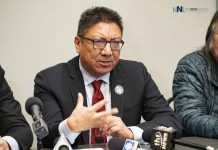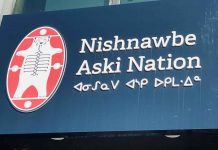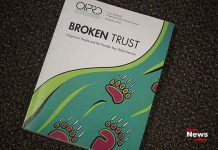TORONTO – Derek Fox, the Grand Chief of Nishnawbe Aski Nation is facing suspension after being accused of workplace harassment and violating the executive code of conduct.
Derek Fox, who leads the Nishnawbe Aski Nation (NAN), was suspended with pay by the organization’s executive council last month pending a code-of-conduct investigation.

On Thursday, an emergency meeting of NAN chiefs was held in Toronto to discuss his fate. The chiefs voted to uphold his suspension and appoint an interim Grand Chief until the investigation is completed.
However, Mr. Fox refused to accept the decision and left the meeting wearing his headdress. He reportedly told a photographer outside: “Still the Grand Chief. You can write that.”
Fox’s lawyer, Rebecca Amoah, said in a statement that Mr. Fox was denied the opportunity to address the chiefs and defend himself against the allegations. She also questioned the validity of the motion, saying that many chiefs were absent or represented by proxies and that there was no quorum.
“He still has not been provided with an opportunity to address the Chiefs, or disclosure of the evidence supporting the allegations against him, contrary to the Executive Council Code of Conduct,” Ms. Amoah said.
NAN represents 49 First Nations and about 45,000 people in Northern Ontario. It advocates for their inherent rights and interests on issues such as health care, education, justice and economic development.
Mr. Fox has been Grand Chief since 2018 and was re-elected last year for another three-year term.
He is also facing a defamation lawsuit from another chief who accused him of being an “abuser” during a speech at an Assembly of First Nations meeting in December.
Text of Nishnawbe Aski Nation’s Code of Conduct
EXECUTIVE COUNCIL CODE OF CONDUCT
CODE OF CONDUCT PRINCIPLES
Nishnawbe-Aski Nation (“NAN”) is committed to the well-being of NAN communities and their members and respecting traditional values including:
Respecting one another, our culture and our traditions.
Working together with trust, respect, open and honest communication.
Honouring the principles of the “Seven Sacred Teachings” which includes courage, humility, respect, honesty, love, truth and wisdom.
NAN communities are entitled to expect the highest standards of conduct from the members that it elects as Grand Chief and Deputy Grand Chiefs (the “Executive Council”). In turn, adherence to these standards will protect and maintain NAN’s reputation and integrity.
In keeping with the foregoing principles, members of the Executive Council shall:
- Serve and be seen to serve NAN communities in a conscientious and diligent manner and in accordance with traditional values
- Be committed to performing their functions with integrity and to avoiding the improper use of the influence of their office, and conflicts of interest, both apparent and real
- Perform their duties in office and arrange their private affairs in a manner that promotes public confidence and will bear close public scrutiny
- Seek to serve the interest of NAN community members by upholding both the letter and the spirit of the laws and policies adopted by NAN
- IMPROPER USE OF INFLUENCE
No member of Executive Council shall use the influence of her or his office for any purpose other than for the exercise of her or his official duties.
Examples of prohibited conduct are the use of one’s status as a member of Executive Council to improperly influence the decision of another person to the private advantage of oneself, or one’s parents, children or spouse, staff members, friends, or associates, business or otherwise.
This would include attempts to secure preferential treatment beyond activities in which members normally engage on behalf of their constituents as part of their official duties. Also prohibited is the holding out of the prospect or promise of future advantage through a member’s supposed influence within Executive Council in return for present actions or inaction.
- CONDUCT REGARDING CURRENT/PROSPECTIVE EMPLOYMENT
No member shall use their position to gain an unfair advantage in securing prospective employment or allow the pursuit of future employment to affect the performance of his or her duties to NAN.
- CONDUCT AT COUNCIL AND COMMITTEE MEETINGS
Members shall conduct themselves with respect and decorum at Executive Council and committee meetings.
XII. IMPROPER INFLUENCE OF STAFF
Only the Executive Council as a whole has the authority to approve budget, policy, committee processes and other such matters. Accordingly, members shall direct requests outside of the Executive Council-approved budget, process, or policy, to the appropriate body or committee. Under the direction of the Chief Administrative Officer, staff serve the Executive Council as a whole, and the combined interests of all members as evidenced through the decisions of the Executive Council. Members shall be respectful of the role of staff to provide advice based on political neutrality and objectivity and without undue influence from any individual member or faction of the Executive Council.
Accordingly, no member shall maliciously or falsely injure the professional or ethical reputation, or the prospects or practice of staff, and all members shall show respect for the professional capacities of staff.
No member shall compel staff to engage in partisan political activities or be subjected to threats or discrimination for refusing to engage in such activities. Nor shall any member use, or attempt to use, their authority or influence for the purpose of intimidating, threatening, coercing, commanding, or influencing any staff member with the intent of interfering with that person’s duties, including the duty to disclose improper activity.
No member of the Executive Council shall direct staff to perform tasks or engage in activities which are not within the scope of the staff member’s distinct and specialized roles and responsibilities.
XIII. HARASSMENT AND DISCRIMINATION
All members of Executive Council have a duty to treat members of NAN communities, staff, one another and the public appropriately and without abuse, bullying or intimidation, and to ensure that they respect the dignity of individuals, and take reasonable steps to create an environment free of discrimination and harassment.
Harassment is any conduct by an individual that is directed at and offensive to another person or persons in the workplace, and that the individual knew or ought reasonably to have known would cause offence or harm. It comprises any objectionable act, comment or display that demeans, belittles, or causes personal humiliation or embarrassment, and any act of intimidation or threat. It includes harassment within the meaning of federal and provincial legislation.
Discrimination involves treating someone differently or unfairly because of a personal characteristic or distinction which, whether intentional or not, has an effect which imposes disadvantages not imposed upon others, or which withholds or limits access to other members of society, which is prohibited under federal and provincial legislation.
No member of Executive Council shall engage in harassment or discrimination within or outside the workplace or outside working hours, including activities on social media forums.
XIV. DISCREDITABLE CONDUCT
Executive Council shall refrain from engaging in conduct that would discredit or compromise the integrity of NAN or any NAN community.
Discreditable conduct includes:
- General and personal misconduct (i.e. obscene language, fighting, excessive use of alcohol and the use of drugs)
- Failure to attend in and participate at meetings and/or refusing to carry out the direction by Chiefs in assembly
- Failure to declare a conflict of personal interest and participated in decision-making regarding subject matter related to the personal interest;
- Dishonesty (i.e.: theft, and the intentional disclosure of false information)
- Conviction of an indictable offence.
- FAILURE TO ADHERE TO POLICIES AND PROCEDURES
The provisions of this Code of Conduct incorporate the NAN APP and other policy as adopted by NAN Chiefs in Assembly.
Members of Executive Council are required to observe the terms of all policies and procedures established by NAN.
XVI. REPRISALS AND OBSTRUCTION
Members of Council should respect the integrity of this Code of Conduct and investigations conducted under it. Any reprisal or threat of reprisal against a complainant or anyone for providing relevant information is therefore prohibited. It is also a violation of this Code of Conduct to obstruct NAN in the carrying out of its responsibilities, as, for example, by the destruction of documents or the erasing of electronic communications.
XVII. DUTY TO DISCLOSE
Where a member of Executive Council becomes aware of conduct by a member that is or may be in contravention of this Code of Conduct, the member has the duty to advise his or her remaining member colleague and together these members shall ensure that any potential contravention is investigated and the matter brought forward to appropriate authorities and the membership if required.
Where the member becoming aware is not able to advise his or her remaining member colleague, that member shall themselves ensure that such abovementioned potential contravention is investigated as required above.
XVIII. INVESTIGATION
A member of Executive Council whose conduct or performance is being investigated or inquired into by NAN membership shall decline to exercise his or her duties as a member of Executive Council for the duration of the investigation or inquiry.
In accordance with the Executive Council’s duty to disclose in Section XVI herein, investigations shall be conducted by the Executive Council/Chiefs’ Finance Committee in conjunction with NAN administration.
Terms of the investigation shall be determined based on the nature of the incident or incidents being investigated, by the Executive Council/Chiefs’ Finance Committee in conjunction with NAN administration.
XIX. PENALTIES
Any member who violates any of the provisions of this Code of Conduct may, after having had the benefits of fair and due process, be subjected to such sanctions as are appropriate and are determined by NAN membership.
After following due process of fairness which shall include the provision of an opportunity for the member to address the membership at a NAN Chiefs meeting, the NAN membership may determine that a member of the Executive Council is guilty of a breach of this Code of Conduct and may:
- declare him or her suspended from official duties for a period of time not to exceed his or her remaining term of office, and may in addition suspend remuneration for the same
period, or
- declare the member’s position to be vacan
- in addition, where applicable, the NAN membership may determine there should be:
- repayment or reimbursement of moneys received; or
- return of property or reimbursement of its value.







